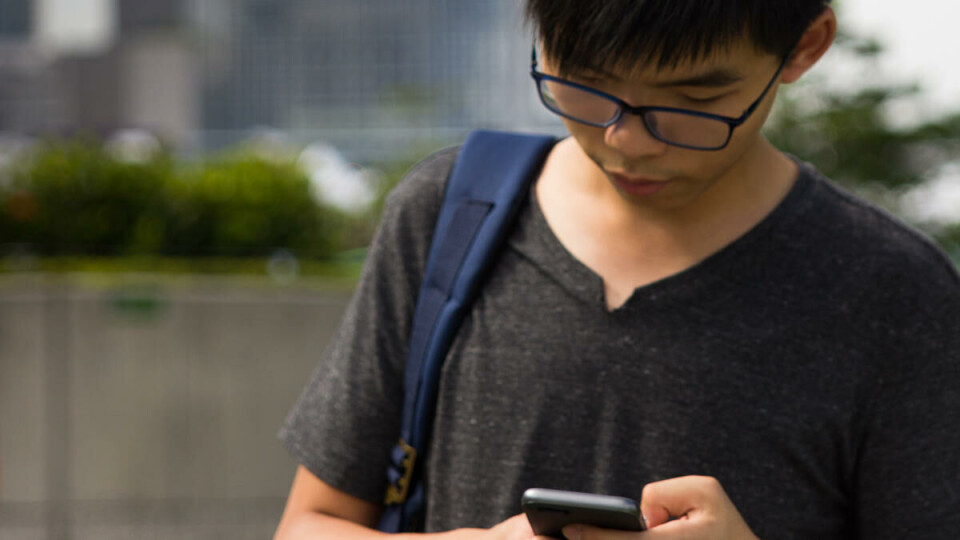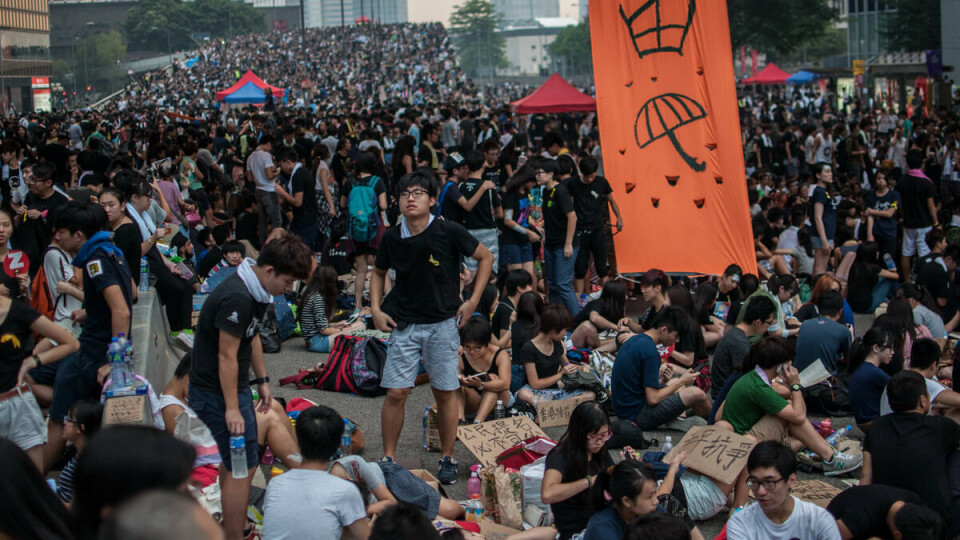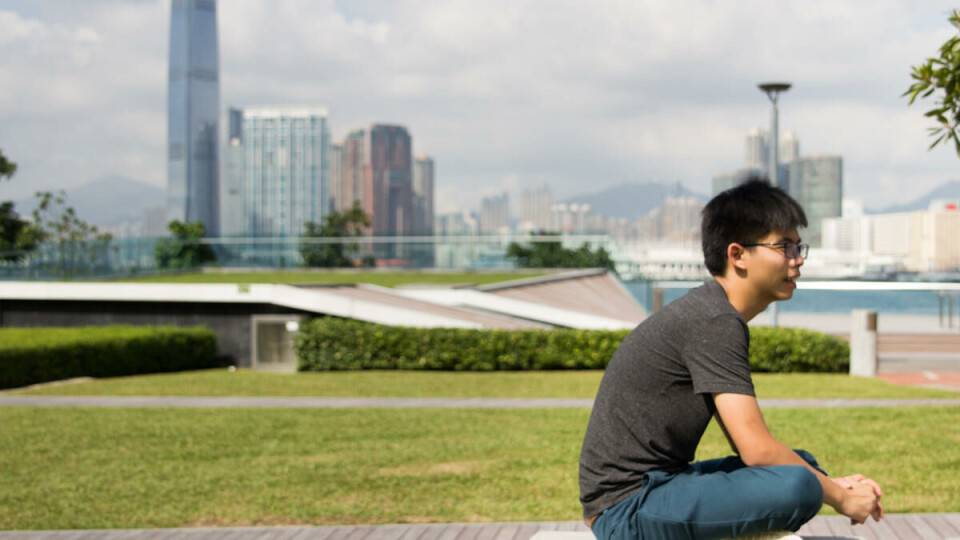Joshua Wong: The face of democracy
Joshua Wong became famous throughout the world when he started the Umbrella Revolution in Hong Kong. Despite hunger strikes, apprehension and beatings by the police, he is still optimistic.
– How would you describe yourself?
– Uhm. I’m Joshua Wong.
– And who is Joshua Wong?
– Different people may have varied perceptions of me, but I just let my affection and passion for civil society speak for me, so that people can judge for themselves.
Two years ago, he graced the cover of Time Magazine, under the title «The Face of Protest». Today, he’s studying political science while working as a politician in the newly founded party Demosist.
We met him in Tamar Park, just across from the government quarter in the financial city. One hour before we met him, he was about to cancel the meeting. That same day, a major Beijing-friendly demonstration had taken place, with local media estimating that as many as 10,000 protestors showed up. The crowd were protesting against two young and newly elected politicians wanting complete secession from China.
Norwegian version: Joshua Wong: Sultestreiket for demokrati

This is far from the only demonstration that has taken place in Hong Kong over the years. Two years ago, the eyes of the world were focused on students boycotting lectures to demonstrate against China’s intervening in Hong Kong’s election of a new leader. The students were met with pepper spray and tear gas by the authorities.
The police’s brutal methods used against peaceful protesters provoked strong reactions among the rest of the population. Tens of thousands of young and old flocked to the streets of the metropolis. Hubs were occupied, the traffic stopped completely, and the streets were filled with residents. The demonstrators gathered while they were waiting to be heard. Several of them carried umbrellas to protect themselves from the sun and rain. The startling demonstrations in Hong Kong were soon named «The Umbrella Revolution».
At the forefront of it all stood 17-year-old Joshua Wong.
– I have fifty minutes.
Wong quickly glances at his phone. He sends a long look towards the nearest café, but allows himself to be persuaded to have the interview down by the water, where a number of impressive skyscrapers adorn the countryside of Hong Kong.
I´m born here, and I love Hongkong
After nearly a century under British rule, Hong Kong was returned to China in 1997 with a promise that the administrative region would be controlled under the scheme «one country, two systems». Since then, a new generation of Hong Kongers have grown a strong sense of identity with the region. Together, they have seen China adopt measures for action to reintroduce control, despite the promise that Hong Kong will become independent in 2047, 50 years after the takeover.
– I wanted people to know there existed an alternative to letting the Beijing-friendly elite decide the future of Hong Kong. The authorities should provide more opportunities for the younger generations, so that we can get into a position in society where we have more influence.
Determined, he answers the question on what made him become an activist at the age of 14 before he gazes out at the skyline of the city. Wong was born into what he describes as «an ordinary family», and although the 20-year-old has mostly remained in his hometown, he has already received considerable international attention.
After his first demonstration in 2010, activism became a great part of his every day life. In 2011, he was featured in several newspapers as one of the founders of the pro-democratic movement, Scholarism. The group were the first amongst students demonstrating against China’s wish to incorporate «Moral and National Education»-curriculum standards in 2012. A measure that partly omitted to teach them about the Tiananmen massacre of students protesting against the Communist Party of China in 1989, and which tried to make the party look good. Scholarism protested against the curriculum standards for six months, leading to Beijing cancelling it. It felt like a miracle.
– We hoped our actions could make something we first thought was impossible possible, while at the same time telling Beijing that they shouldn’t think they could decide everything.
His sentences are short, carrying a broad, Cantonese accent. While talking, he pushes his thick-lensed glasses further up the back of his nose and squints towards the sun.
On September 26th, 2014 Joshua Wong announced a student boycott against the celebration of China’s 65-year anniversary. The protest took place at the same park he is now located in. Wong urged hundreds of protesters to storm Civic Square, just outside the government building. Once again, police with batons and tear gas charged students, and the humble activist was arrested.
– We used all the non-violence and peaceful methods we could.
Two days later, he was set free and the «Occupy Central»-movement was formally started.

Beijing would not let a democracy activist control the financial metropolis. The Chinese people were also of the opinion that the few people who would have the opportunity to vote during the same election in 2017 only would be able to choose between two candidates chosen by the communist party. The demonstrations gained attention from the international community, but Chinese authorities were not to persuade. Together with other activists, Wong started a hunger strike and demanded to meet with politicians in Beijing to speak.
– Of course it was tiring and exhausting, but that is the price I have to pay for the democracy movement. Compared to the human right activists in China, my hunger strike wasn’t too bad.
He nods determined, but with his face in in severe folds. The 20-year-old doesn’t seem to believe he performed a feat.
When the Umbrella Revolution failed, Wong and the other activists had no alternative but to find new ways to fight for democracy. The Demosist party? was established in April last year, and Wong’s fellow politician, Nathan Law, 23, is the youngest elected to the city legislature throughout Hong Kong's history. Wong himself was too young to run for election this fall.
– Although I was tired two years ago, we could not retreat. It was just what Beijing wanted us to do. With Nathan elected to Parliament, we send a message to the whole world; Hong Kong continues to fight.
And he did not give up. Just a year after the movement ended, he sent a clear message to China’s president, Xi Jinping, through the British newspaper The Guardian: «Give Hong Kong democracy and autonomy».
The activist life has had its bad sides. Wong was arrested in Bangkok when he was on his way to speak for a fraternity in Thailand. He was assaulted on the street on his way home from the cinema with his girlfriend, and he still experiences Hong Kong becoming increasingly authoritarian. Still, he has never dreamed of leaving his hometown.
– I was born here, and I love Hong Kong.
He repeats himself several times, and questions not involving politics make him slightly uncomfortable. It’s difficult to imagine the private person Joshua Wong behind the fervent activist.
As a reply to the question as to whether he is afraid to continue the fight against the world's most powerful authoritarian regime or not, he grins.
– Feeling that «big brother is watching you» is not enough to keep me from fighting. If I were afraid, I would already have pulled away. We’re just doing our best.
Wong was recently sentenced to 80 hours community service for civil disobedience during the Umbrella Revolution. The documentary about the «Occupy» movement has also just been banned by a number of cinemas in the city, fearing reprisals from Beijing.
– Do you ever get tired of everything?
– I’m optimistic. Hope for the best, prepare for the worst. This is a long struggle, and we do not think we can win this fight only through the Umbrella Movement. But I think we can conquer this. If people stand up against the government, we can see the future together.
Before he hurries along from our meeting under the baking sun to an appointment with his attorney, once again with his nose buried down his mobile phone, he allows one last question.
– Were you aware of whom you stood up against when you started at 14?
– No. I had not expected anything like this, but with great influence comes great responsibility. The Umbrella Revolution has had a massive, positive effect, and it has allowed people to see hope in our city.































